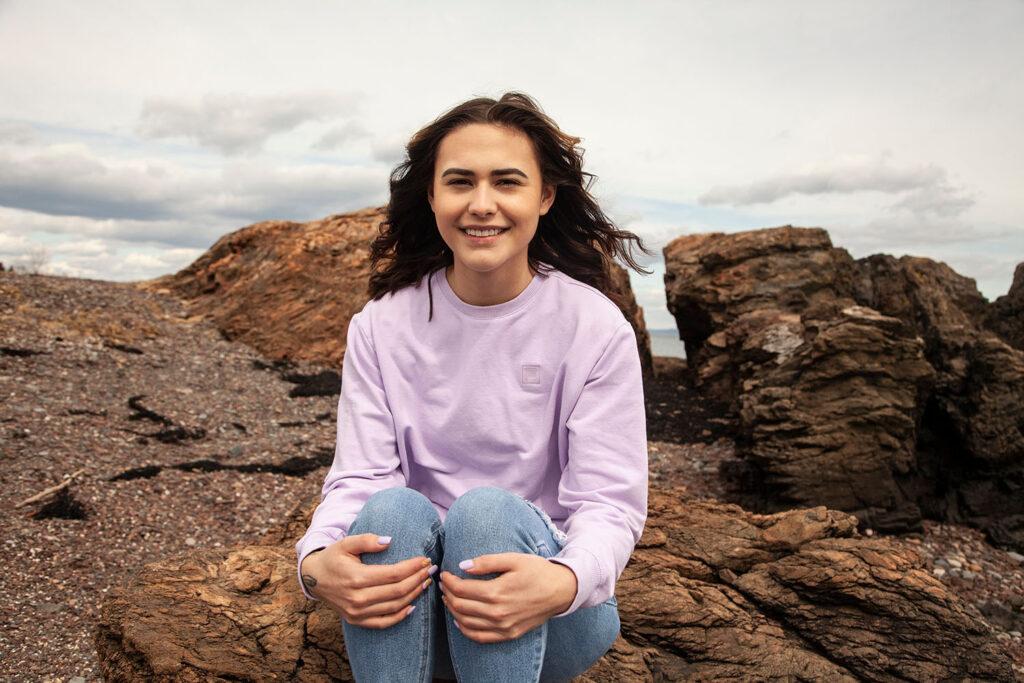Think of how many daily interactions you have with water—morning coffee or tea, washing hands, flushing a toilet, preparing food, watering plants or animals, showering. Now imagine each of those interactions being dangerous and tainted with harmful chemicals and toxins; instead of a simple turn of the tap, each of these interactions requiring bottled water or water sourced from as far as a 30-minute drive away paying 35 cents a gallon.
This is the world in which Noela Altvater grew up and fought to change.
Altvater, 20, a Passamaquoddy tribal member and resident of the territory at Sipayik near Eastport, played a key role in advocating for the passage of LD 906, a state law granting Passamaquoddy people the right to access clean and safe drinking water.

Altvater began her fight for water sovereignty and rights after witnessing generations-long injustice surrounding access to clean and safe drinking water. “In 1955 there were five houses with running water, none of them clean water. You had to trek up and down hills in snow storms and pump it out of the ground to just go home and boil it,” she says.
In the decades since, little had changed. As a child, she recalls loathing bathing because of the red, itchy rash that both she and her brother would get from the water sourced from Boyden Reservoir, fed by Boyden Lake in nearby Perry.
The lake is used recreationally and has been impacted by agricultural runoff resulting in large amounts of organic matter in the water. Chlorine used to disinfect the water, according to tribal officials, results in high levels of trihalomethanes, which can cause cancer, neurological damage, and reproductive harm.
It was an internship in high school that brought her attention to water advocacy. “They wanted me to talk about the alewives and pollution with fish and the clam flats and things like that. I’ve never clammed in my life. I don’t like fish. It basically felt like I didn’t have a right to speak on it, because I didn’t follow it.”
Reflecting on this feeling and her personal experience with water, Altvater shifted her approach for the project to focusing on the human-centric effects of water injustice on tribal land. She conducted door-to-door interviews with various tribal members and elders, creating a story map chronicling cases of unclean water and its effects—from increased poverty to health effects like cancer rates—in an effort to encourage state legislators to take notice and advocate for change.
“We just wanted to get as much information as possible and shove it in people’s faces so they couldn’t deny it,” Altvater says. “It wasn’t the nicest way to go about it, but at that point there had been no talk or conversation and nothing outside of the tribe was happening.”
The story map was published in 2021, and led Altvater to give presentations statewide and in Boston. Her work won her a Brookie Award for environmental leadership from NRCM Rising, the youth membership arm of the Natural Resources Council of Maine, an environmental advocacy group.
And most importantly, her work led to the eventual passage of LD 906 and the drilling of a new, clean well on the tribe’s land in 2022.
The law—An Act To Provide Passamaquoddy Tribal Members Access to Clean Drinking Water, sponsored by tribal representative Rena Newell—exempted the Passamaquoddy Water District’s property from municipal taxes (it had been the only water district in Maine not exempt). It also allowed the tribe to add two parcels of land it owned to the tribe’s official territory through the federal trust acquisition process to provide access to alternate supplies of groundwater.
The law also gives the primary regulatory power over the water to the U.S. Environmental Protection Agency and not the state.
Some in the tribe have said that Altvater is walking in the footsteps of her grandmother, Denise Altvater, who advocated for tribal land rights and women’s rights, and worked to expose the injustice of residential schools.
Denise brought Noela under her wing in high school as an intern for her advocacy and political efforts. Noela says she now focuses her efforts on what is happening in nature, climate change, ancestral land, and how human interaction changes that land and its resources.
While focused on nature, Altvater’s connection to the next generation mirrors how her grandmother took her under her wing.
“I want children and young adults to come and say, ‘I want to talk on the things you talk about.’ I don’t want our children to feel like they have to rely on elders to advocate and educate and know they can be a source when they know and have experienced just as much.”
Now that the water law has been adopted, Altvater says she hopes to work with the tribe’s new environmental department to keep large-scale issues and causes personal rather than political.
“My basis is to keep it culturally connected to myself. It has to be a basis of ‘This helps my community, my people in turn,’ not just myself,” she says.
“It’s not about what I want or deem necessary. It’s about the advocacy of what our people need and what the land needs.”
This connection to land and reverence for the path of her people rings true in Altvater’s favorite place on the tribe’s land, Split Rock, a giant boulder on the coast that had been perfectly split in half by lightening.
“It holds history, culture, the power of water and the ocean and how long we’ve been here. It is a foundation of who we are. It ties us to where we are. It sets a foundation for us being a part of the place we are in.”


